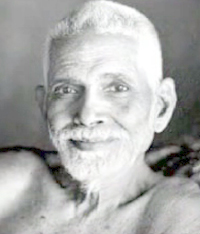
The Tamil verb that is used most commonly in situations in which we would use the verbs ‘ask’ or ‘question’ in English is kettal. For example, when we read such books and find in them statements attributed to him such as "ask yourself ‘who am I?’" or "question yourself ‘who am I?’", in order to understand the correct sense in which he used whatever Tamil verb has been translated as ‘ask’ or ‘question’, we have to try to infer what that verb might have been. Therefore, when we read the books in which his teachings are recorded in English, we have to try to infer what words he may actually have used in Tamil. However, from his own original Tamil writings, and from the record of many of his oral teachings that Sri Muruganar preserved for us in Guru Vachaka Kovai, we do know what Tamil words he used frequently to express his teachings. Unfortunately, therefore, from such records we cannot know for certain exactly what words he used in Tamil on each particular occasion. However, though he seldom expressed his teachings in English, many of the books in which his oral teachings were recorded during his bodily lifetime were written originally in English. If what he said in Tamil was seriously mistranslated, he would occasionally correct the translation, but in most cases he would not interfere with the interpreter’s task. Even when he was asked questions in English, he usually replied in Tamil, and each of his replies would immediately be translated into English by any person present who knew both languages.

Though he understood and could speak English quite fluently, when discussing spiritual philosophy or practice he seldom spoke in English, except occasionally when making a simple statement.

In order to understand why such potentially confusing wordings appear in some of the books in which the oral teachings of Sri Ramana have been recorded in English, we have to consider several facts.įirstly, whenever Sri Ramana was asked any question regarding spiritual philosophy or practice, he usually replied in Tamil, or occasionally in Telugu or Malayalam. However, though atma-vichara or ‘self-investigation’ is truly not any form of mental activity, such as asking ourself ‘who am I?’ or any other such question, but is only the practice of abiding motionlessly in our perfectly thought-free self-conscious being, in some English books we occasionally find statements attributed to Sri Ramana that are so worded that they could make it appear as if he sometimes advised people to practise self-investigation by asking themself questions such as ‘who am I?’. In continuation of my previous post, Atma-vichara is only the practice of keeping our mind fixed firmly in self, the following is what I have newly incorporated on pages 441 to 445 of the forthcoming printed edition of Happiness and the Art of Being:


 0 kommentar(er)
0 kommentar(er)
